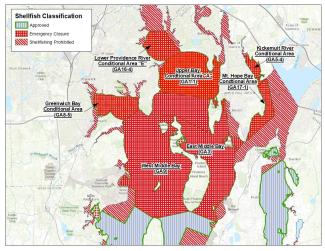Heavy Rain Closes Shellfishing Areas in Narragansett Bay & Salt Ponds
Published on Thursday, December 12, 2024
PROVIDENCE, RI – The Rhode Island Department of Environmental Management (DEM) is announcing that several shellfish areas in Narragansett Bay and the coastal salt ponds are closed due to excessive rain received yesterday.
Upper Narragansett Bay Area A, Upper Narragansett Bay Area B, and Lower Providence River Area E are closed to shellfishing and are scheduled to reopen at sunrise on Dec. 22. In addition, Greenwich Bay, Mount Hope Bay, the Kickemuit River, the West Middle Bay shellfish area (GA9) and the East Middle Bay shellfish area (GA3) are closed to shellfishing until sunrise on Dec. 19.
This emergency closure includes waters of Narragansett Bay north of a line running from Quonset Point in North Kingstown to the northern tip of Conanicut Island (Jamestown) to the southern tip of Prudence Island to Carr Point in Portsmouth. Additionally, the waters of coastal salt ponds (Pt. Judith Pond (area 10PJ), Potter Pond (area 10PP), Ninigret Pond (area 11N), Quonochontaug Pond (area 11Q), and Winnapaug Pond (area 11W) will be closed to shellfish harvest until noon on Dec. 19.
Yesterday’s heavy rain dropped 4.2” of rain at the TF Green monitoring station and 3.7” of rain in Westerly, with more localized totals of 4 to 5 inches in less than 24 hours reported throughout RI. This excessive rainfall caused heavy stormwater runoff and caused several combined sewer overflows (CSO) discharges. This runoff can convey bacterial contaminants to Narragansett Bay and the salt ponds, prompting this shellfish closure. Previous water quality observations indicate that the bacteria levels will return to normal, safe background levels in the above-mentioned timeframes. DEM will confirm these background levels with sampling early next week.
DEM, the Rhode Island Department of Health (RIDOH), and the RI Coastal Resources Management Council (CRMC), along with industry partners, collaborate to ensure that shellfish grown and harvested from Rhode Island waters continues to be a quality safe seafood product to be enjoyed by all consumers. This monitoring enables a quick response when conditions indicate a change in water quality due to natural events such as algae blooms or unusual weather events.
For more information on the shellfish harvesting classifications, review the annual notice available at www.dem.ri.gov/shellfish. An interactive shellfishing map is also available.
For information on emergency and conditional area water quality related shellfish closures, call DEM’s 24-hour shell fishing hotline at 401-222-2900 or sign up for DEM’s Office of Water Resources' email notification list.
For more information on DEM programs and initiatives, visit www.dem.ri.gov. Follow DEM on Facebook, Twitter/X (@RhodeIslandDEM), or Instagram (@rhodeisland.dem) for timely updates. Sign up here to receive the latest press releases, news, and events from DEM's Public Affairs Office to your inbox.

